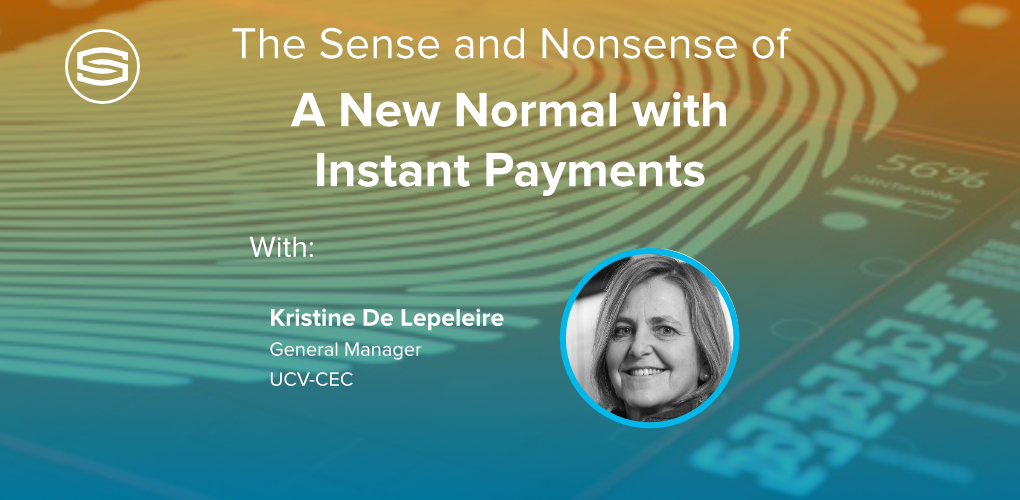
Insights & Opinions
The Sense and Nonsense of a New Normal with Instant Payments
Tue, 22 Nov 2022


In an effort to speed up the process of making instant payments the New Normal, the European Commission (EC) issued a new proposal to ensure that all banks that allow sending and receiving regular Sepa credit transfers (SCT) today will also offer an instant alternative at the same cost.
Belgium was always one of the frontrunners in instant payments. We invited Kristine De Lepeleire, General Manager of CEC-UCV, to discuss this. CEC-UCV is Belgian’s national clearing channel and the provider of national instant payments in the country.
From the start in March 2019, CEC-UCV can be proud of having 13 out of 15 members supporting instant payments, reaching 85% of all accounts in Belgium. Today this reach evolved to 90%-95%, and 18,5% of all credit transfers are instant. As a benchmark: for Europe, this is only 11%.
Making abstraction of the 60% bulk payments, instant payments even outnumbered regular SCTs in Belgium.
The European Commission’s Proposal for the New Normal
The EC decided to step in to speed up the process of having instant payments across the continent as the New Normal. Its proposal consists of 4 fundamental changes, explained Kristine.
The biggest chunk is that every financial institution that offers SCTs today is supposed to offer instant payments as well. The devil is in the details, as those institutions need to offer them via all the channels a customer has at its disposal, including very likely bulk payments.
Yes, also private banks with a daily banking offering today are affected, or other niche players that offer payments as a nice to have, with low volumes of transactions. It will be mandatory for every organisation with the possibility to participate directly in the clearing systems.
On top of that, financial institutions are expected to offer instant payments at the same price as regular SCTs. Kristine rightfully questioned this, asking whether the regulator should be talking about pricing. In the end, banks have immense investments in front of them and need to earn that investment back somehow. If banks cannot change them directly, they will need to find alternatives like increasing the price of daily banking services affecting all clients, including the ones that are not interested in instant payments.
To ensure that instant payments can be processed securely, the EC expects financial institutions to install an IBAN-Name Check on all channels that allow payment initiation.
Finally, the proposal included a sanction screening on all clients at least once a day.
The Sense and Nonsense of the New Proposal
The numbers at the beginning of the article are clear: if you let the market play, instant payments will not be the new normal in Europe anytime soon. However, the proposal opens much debate on its proportionality.
Should all financial institutions offer instant payments? Does it make sense that small players in, for example, private and wealth banking, are mandated to upgrade their infrastructure while their customers don’t expect them to offer best-in-class payment solutions?
Are big corporate and payroll agencies waiting to process their bulk payments within seconds?Tiina Laukkonen, Senior Payments Expert at Amazon, shared with us on May 11 that they don’t see much value in most bulk payments. So whether bank infrastructures are ready or not, often clients don’t even expect them to offer instant payments in most situations (60% are bulk payments, remember?).
From the moment the regulation is in force, banks have 12 months to comply. Although it will take many discussions for the regulation to be published, Kristine argued that banks that still have to start their instant payments journey have no time to waste.
The Belgian banking community is already investigating implementing an IBAN-Name Check solution, so this would not be a big impact on a national level. Implementing this on a European level is a different game, as it probably requires a new scheme for local solutions to connect.
People in the audience did confirm that fraud levels are higher for instant payments compared to SCTs. Examples of IBAN-Name Check solutions proved that the best practice is to mandate it across all participants in the market, as we learned in the session with Surepay on January 21, 2022.
So it makes sense for the EC to suggest solutions to counter fraud in a world where instant payments are the new normal, but will the industry be ready on time?
Finally, there is the sanction screening that runs up against the limits of the European regulatory framework. If the intention is to make a central registry of accounts identified as mule accounts, GDPR comes into play.
Each country implemented this directive with its own interpretation. Kristine explained: “[In Belgium] we live in a country where the Data Protection Authority is very strict. Banks feel very limited in what they can do with respect to this data protection, which is a little bit counterintuitive in the context of trying to protect the customers.”
What is the New Normal?
Suppose the industry can overcome these challenges or find a new balance with the EC for a revised proposal, will it bring a New Normal with more competition in the payments market?
In the world of credit transfers, probably yes. In the world of cards, it is doubtful. The discussions during the session made clear that instant payments will not replace cards anytime soon, although Kristine believes that they may take part of the market. The reasoning is that those card transactions are much more than a payment.
Card payments are debit and credit, but even more, a huge set of rules and rulebooks to ensure a smooth process and if things go wrong, a smooth solution. These trusted mechanisms will not be replaced easily, not even by combining the Request-to-Pay principles with Instant Payments.
Conclusion
Having heard all the discussions last week, on November 17, 2022, I believe the new proposal by the EC will have a significant impact and result in a much higher concentration of instant payments, even after revising some of its elements.
And I can see a New Normal in the context of credit transfers. It will take much more innovation to have instant payments as the new normal in the P2B or the B2C space, where card schemes dominate the market today, with rulebooks that go far beyond payment processing.